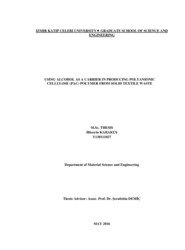Using alcohol as a carrier producing polyanionic cellulose (PAC) polymer from solid textile waste
-
Eser Sahibi
Karakuş, Hüseyin
- Tez Danışmanı Şerafettin DEMİÇ
-
Tür
Yüksek Lisans
- Yayın Tarihi 2016
-
Yayıncı
İzmir Katip Çelebi Üniversitesi Fen Bilimleri Enstitüsü
- Tek Biçim Adres Http://hdl.handle.net/11469/652
-
Konu Başlıkları
Selüloz
Cellulose
Polyanionic cellulose (PAC)
Polianyonik selüloz (PAC)
Textile waste
Tekstil atıkları
Cellulose is the most abundant organic polymer on earth. It is naturally regenerated by forests and cotton plantations with a speed of 10 billion metric tons per year regularly. Not only its natural reproduction makes it ecologically beneficial but also its biological degradability makes cellulose an ‘eco-friendly material’. Applications of cellulose is limited due to its insolubility in water. Contrarily, its water-soluble derivatives, especially cellulose ethers, are found in nearly all the products we are using in our daily life.
Although cellulose is the main raw material for producing cellulose ethers, its commercial production stopped with the shutdown of ‘Turkish Cellulose and Paper Factories’ (SEKA) in 2006. Turkish cellulose ether producers are forced to import all the cellulose they are using in their production. In 2009, 425 thousand tons of household textiles waste and 458.5 thousand tons of industrial textile waste was generated in Turkey. Most of these wastes are made of cotton yarn which has 90% cellulose content.
This study aimed to use this type of textile waste as raw material for the production of polyanionic cellulose polymer (PAC), so that they would be returned back to the economy with higher values. This study is carried out as a project by The Scientific and Technological Research Council of Turkey (TÜBİTAK) and Ugur Seluloz Kimya A.S. under the 1507 - SME RDI (Research, Development & Innovation) Grant Programme. In this waste recovery process, solid textile waste is used as raw material and the alcoholic (ethyl alcohol) medium is used to increase the quality of the PAC products in order to meet the criteria of PAC LV (low viscosity) and PAC HV (high viscosity) standards introduced by American Petroleum Institute (API).
The most important outcome of this study was to produce PAC-LV and PAC-HV polymers in API standards from textile waste without using any imported cellulose. This production method not only prevents the import but also enables the use of natural wastes so that the added value of the product increases. Quality of synthesized products (PAC-LV and PAC-HV) are verified by Turkish Petroleum (TP) Research Laboratories.
-
Koleksiyonlar
ENSTİTÜLER
FEN BİLİMLERİ ENSTİTÜSÜ

 Tam Metin
Tam Metin

